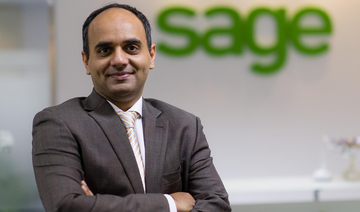HONG KONG: For Chinese cloud services companies, the coronavirus outbreak has become a rainmaker, bringing in new business far and wide as firms shift work online, and authorities develop apps and systems to help contain outbreaks and manage social restrictions.
For Tencent Holdings, in particular, it has also become the perfect time to flex new muscles as it seeks to catch up with Alibaba Group Holding, its arch-rival and the dominant player in the country’s cloud market by far.
Tencent began to display a new level of aggressiveness after positioning its cloud business as a major area of growth in September 2018, and that has only amped up amid the pandemic, employees say.
“The competition with Alibaba is so fierce right now, the sales teams are fighting them for every deal,” said a source in Tencent’s cloud division who was not authorized to speak on the matter and declined to be identified.
This year alone, Tencent has hired more than 3,000 employees for its cloud division. And as China went into lockdown and demand for corporate video bandwidth surged in February, it added 100,000 cloud servers in eight days to support a two-month old product, Tencent Conference — a feat the company says is unprecedented in Chinese cloud computing history.
It has expanded use of cloud servers designed in-house, pledged to speed up construction of a digital industry center in Wuhan to handle cloud and smart city projects in central China and joined a central government initiative to support pandemic-hit small businesses with free cloud services.
The social media and gaming behemoth also announced in May it will invest 500 billion yuan ($70 billion) over five years in technology infrastructure including cloud computing — just weeks after Alibaba said it would invest 200 billion yuan in its cloud infrastructure over three years.
Poshu Yeung, vice president of Tencent’s international business group, notes huge interest in shifting further into the cloud from businesses and for online education.
“We actually see more demands, requests coming in,” he said in an interview in April. “It’s a good wakening call for a lot of businesses.”
During the first quarter, China’s cloud infrastructure services market grew an impressive 67 percent from a year earlier to $3.9 billion, data from research firm Canalys shows.
Alibaba commanded 44.5 percent of the market while Tencent, which started its cloud business in 2013, four years after Alibaba, had just 14 percent. Huawei Technologies also had 14 percent.
“Although Tencent came to the space later than Alibaba, I believe the company is willing to endure a relatively long period of investment cycle for this business, hoping to catch up or one day becoming the No. 1 player in this field,” said Alex Liu, tech analyst at China Renaissance.
Tencent’s cloud division accounted for more than 4.5 percent of its annual revenue last year while Alibaba’s cloud computing division accounted for 8 percent of its overall revenue.
Tencent employees have told Reuters the company is working hard to become more adept in business-to-business sales where products are often designed from the ground up for one client, as well as in government relations.
Those are areas where Alibaba excels while Tencent’s strength lies more with consumer-centric products and design.
“Tencent has great genes in business-to-consumer, but in business-to-business, we either didn’t have product managers or we just hired folks with a business-to-consumer background so it took a bit of time to convert their thinking,” said a second Tencent source in the company’s cloud business.
Tencent declined to comment on staff observations.
One area where Tencent has gained ground in recent years is government contracts — a relatively small part of the market in revenue terms but one that brings prestige and helps attract private-sector clients.
Underscoring its determination to win tenders, Tencent in 2017 offered to complete a Fujian province government information platform project for 0.01 yuan.
From 2016 to 2017, Alibaba scored 28 cloud-related contracts for government entities, state-owned enterprises, and academic institutions, while Tencent landed just seven, government procurement records show.
But in 2018, they secured 28 each before Alibaba took the lead again last year with 49 compared with Tencent’s 46.
























